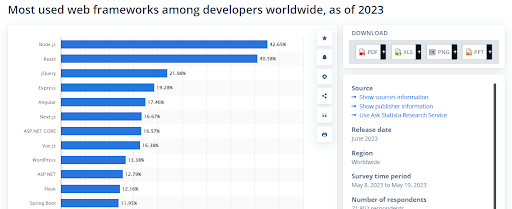Want to Hire a Node.js Developer? Then You Should Know How to Find the Best JS Programmers!
- Hire a Dedicated Node JS Developer and Create a High-Performance Web Solution for Your Business
- Why Choose Node.JS?
- Node JS Software Solutions: An Almost Universal Platform
- How to Choose the Right Node JS Developer for Hire
- Benefits of Outsourcing Node JS Development Services
- Hire Freelance Node JS Developer on Upstaff
Hire a Dedicated Node JS Developer and Create a High-Performance Web Solution for Your Business

The Node.js software platform is a highly efficient Java Script code interpreter based on the Chrome V8 engine. In other words, it is a run-time environment for web applications or applications with a web back-end component.
- According to research, this web framework holds about 42.65% of the market for solutions for the development of modern digital products.
While previously the platform was used to develop interactive websites, it has now been modernized to the point where it can be used in various types of solutions, particularly in mobile and desktop applications, SPAs, web platforms, and leveraging front-end technologies, making it ideal when you hire Node.js developers for full-stack development.
Are you going to sell your own product on this platform? Well, then you need to hire a Node js developer. And we will help you carry out this task.
Why Choose Node.JS?
One of the reasons to hire a Node js expert is the direct benefits of developing products based on this framework. In short, it offers a fairly wide range of opportunities and features of future solutions.
In particular, these are:
- High efficiency. The framework is lightweight and simple to use, efficient in terms of resource use both during development and during the deployment and launch of ready-made solutions.
- Real-time applications. Thanks to the fast exchange of data between the elements of the application infrastructure and the instant processing of commands, the framework can be considered ideal for the deployment of communication and gaming platforms.
- Scalability. The platform can simultaneously work with numerous inputs without losing performance, so it is the best solution for products that require multithreaded commands.
- Efficient and reusable code. You don’t have to write application code from scratch because the framework allows you to use existing assets to implement functions. Ultimately, this simplifies the architecture of the application, making it more manageable and easier to use.
- Fast performance. The platform specializes in many simultaneous commands and connections. That is, no matter how large-scale your product is planned, the framework will easily cope with the load.
- Opportunity for Front-end and Back-end development. On the basis of the framework, you can implement both parts of the product at once and synchronize them with each other as much as possible. This reduces production costs and simplifies the maintenance of the application.
However, to get these benefits, you still have to hire Node.js developers. And for this, you should also focus on the type of product you are going to implement. Fortunately, the framework has a lot to offer in this context.
Node JS Software Solutions: An Almost Universal Platform
With the help of the Node js software engineer, you can create completely different types of products. First, we are talking about:
- Web applications. Both small adaptive SPAs and full-fledged platforms have many functions and external integrations.
- Programs for real-time communication. Chats, communication bots, client messengers, etc.
- APIs (application programming interfaces). Microservices for embedding into websites, web applications, and mobile apps.
- Streaming applications. Systems that require high stability and performance of computing operations, many operations.
- E-commerce platforms. Showcases, individual stores, and marketplaces that support various payment systems.
- Social media platforms. Communication and content platforms for numerous users simultaneously connected to the system.
- Content management systems (CMS). Blogging platforms, content resources, news portals, etc.
- IoT (Internet of Things) applications. Interfaces for managing and synchronizing data for specialized equipment.
- Data analysis platforms. Automated systems for managing and processing large amounts of information in a multithreaded mode.
And these are not all examples of products where the framework can be used. In fact, the choice is limited only by the needs of your business and the level of skills of the Node.js app creator, including expertise in AWS Lambda. That’s why it’s worth setting priorities and then looking for a developer for your project.
How to Choose the Right Node JS Developer for Hire
If you’re going to hire a remote Node js developer, make sure they have enough expertise to complete your project. Follow these six basic steps.
Define Your Requirements
You should be straight-forward about what you expect from the project, what goals you plan to achieve, how the product will develop, and what its technical features should be. Prepare a list of requirements in advance to help you match candidates and select the right talent when you hire Node.js developers who will make your solution successful.
Check the Portfolio and Experience
Check out the previous projects of the Node.js development team and individual performers. Review their feedback from previous employers and practical cases, if available. Also, don’t ignore direct communication, as some specialists may work under NDA and not have their own portfolio, particularly regarding their security practices.
Assess Technical Skills
We recommend checking the real level of candidates’ skills through test tasks. Choose tasks related to your type of project. Also, don’t use template tests.
Check Communication Skills
Usually, a Node js professional developer does not have communication problems. However, you need to make aware of this personally to avoid stressful situations during cooperation.
Assess Your Problem-Solving Skills
Stress response, by the way, should also be on your checklist when selecting a contractor. This will determine how efficiently and rapidly challenges will be leveled in case they arise during development.
Discuss Pricing and Availability
Node.js coding experts are often constantly busy with work. Therefore, first, find out if they are ready to accept your order, especially if your project involves real-time data. If so, agree on acceptable rates for both parties in advance.
Benefits of Outsourcing Node JS Development Services
If you’re going to hire a Node js developer, we recommend selecting the outsourcing model of cooperation. This way, you will receive not only qualified assistance but also a number of additional benefits. In particular:
- Custom development. Full product personalization and individual approach. Taking into account project specifications and implementing innovations as needed.
- Experienced developers. Access to a pool of talents with completely different tariff scales, regions of work, and skill levels of potential performers.
- Full-cycle development. End-to-end product development, covering all key stages, from the Discovery phase to the solution support and maintenance.
- Quality assurance. Proactive testing of the product, its technical condition, code cleanliness, compliance with business requirements, and industry standards.
- Support and maintenance. Depending on the terms of cooperation, additional product maintenance services, such as periodic updates, upgrades, problem fixes, etc.
- Scalability. Almost free management of resources, which allows you to increase or decrease the number of performers depending on the current needs of the project.
- Cost-effectiveness. A flexible tariff scale and variability in the size of development teams, as well as their priorities, allows you to dynamically change the cost of the product and stay within the available budget.
Still not sure if you should hire a Node. js developer? Well, we’ll help you make the right decision.
Hire Freelance Node JS Developer on Upstaff
The technical implementation of your product determines its success in the target market. However, the technical implementation depends directly on the developer who is engaged in the project development. You can also find top talent with us to ensure your project’s success.
The Upstaff platform offers you a number of advantages:
- Access to a powerful international talent pool.
- Assistance from local HRs.
- Fast search and hiring of developers.
- Optimal commissions for hiring specialists.
- Guarantee of project completion and free replacement of developers in case of any problems.
Ready to start cooperation? Contact an Upstaff manager for a preliminary consultation and to create a recruitment application!
- Hire a Dedicated Node JS Developer and Create a High-Performance Web Solution for Your Business
- Why Choose Node.JS?
- Node JS Software Solutions: An Almost Universal Platform
- How to Choose the Right Node JS Developer for Hire
- Benefits of Outsourcing Node JS Development Services
- Hire Freelance Node JS Developer on Upstaff
